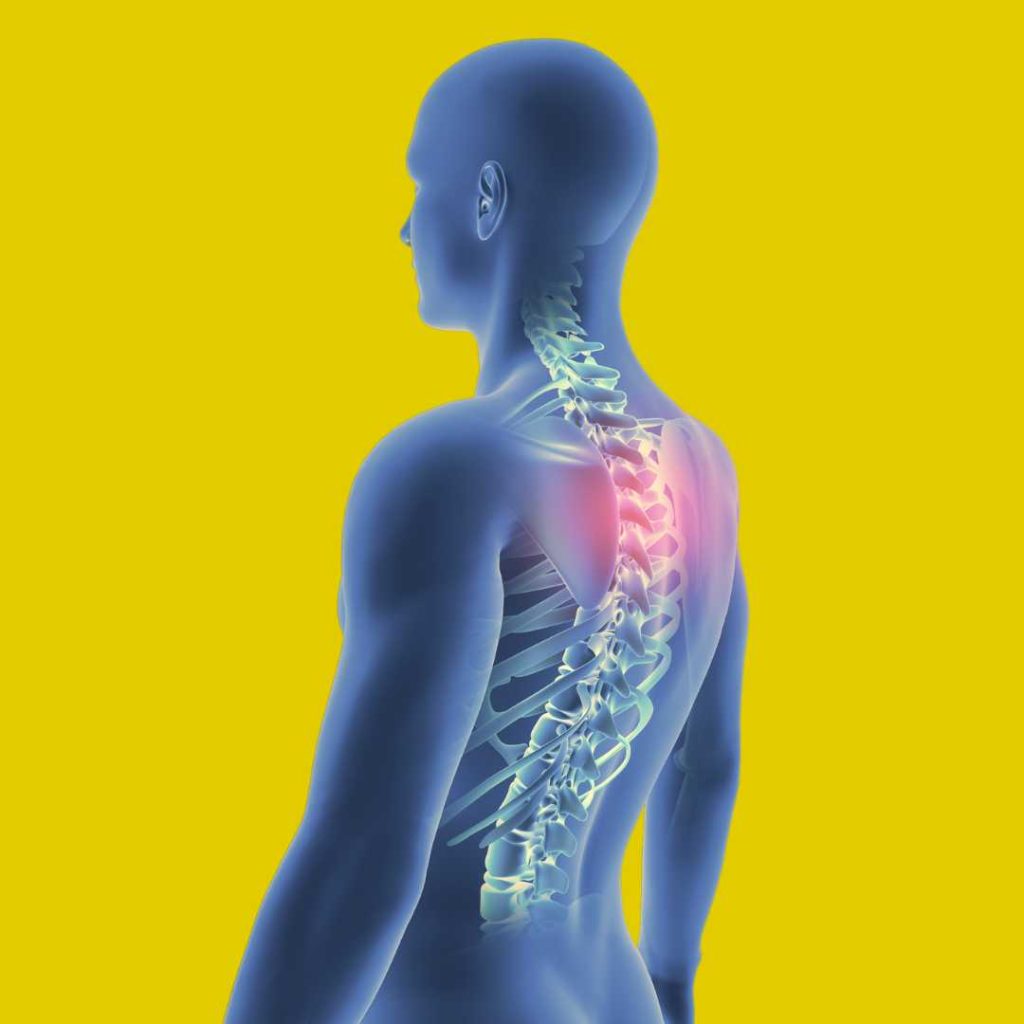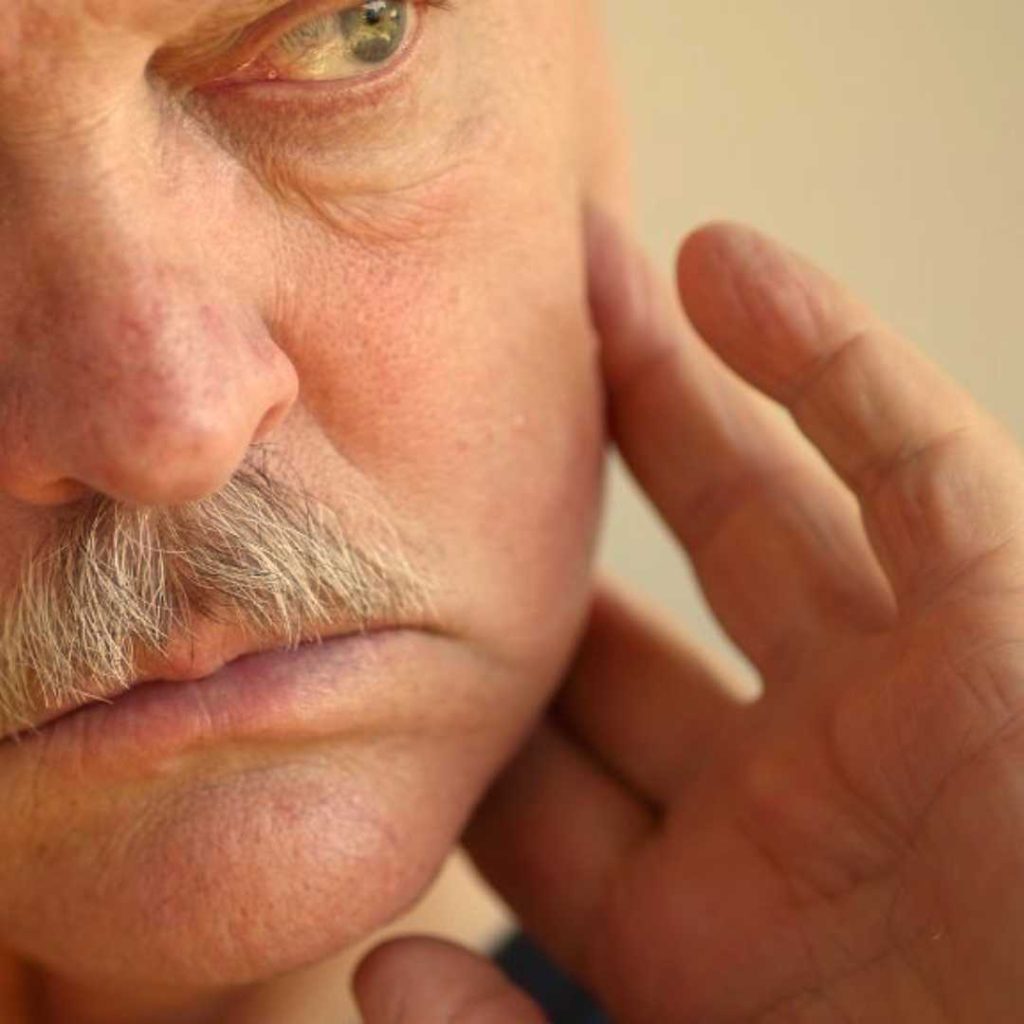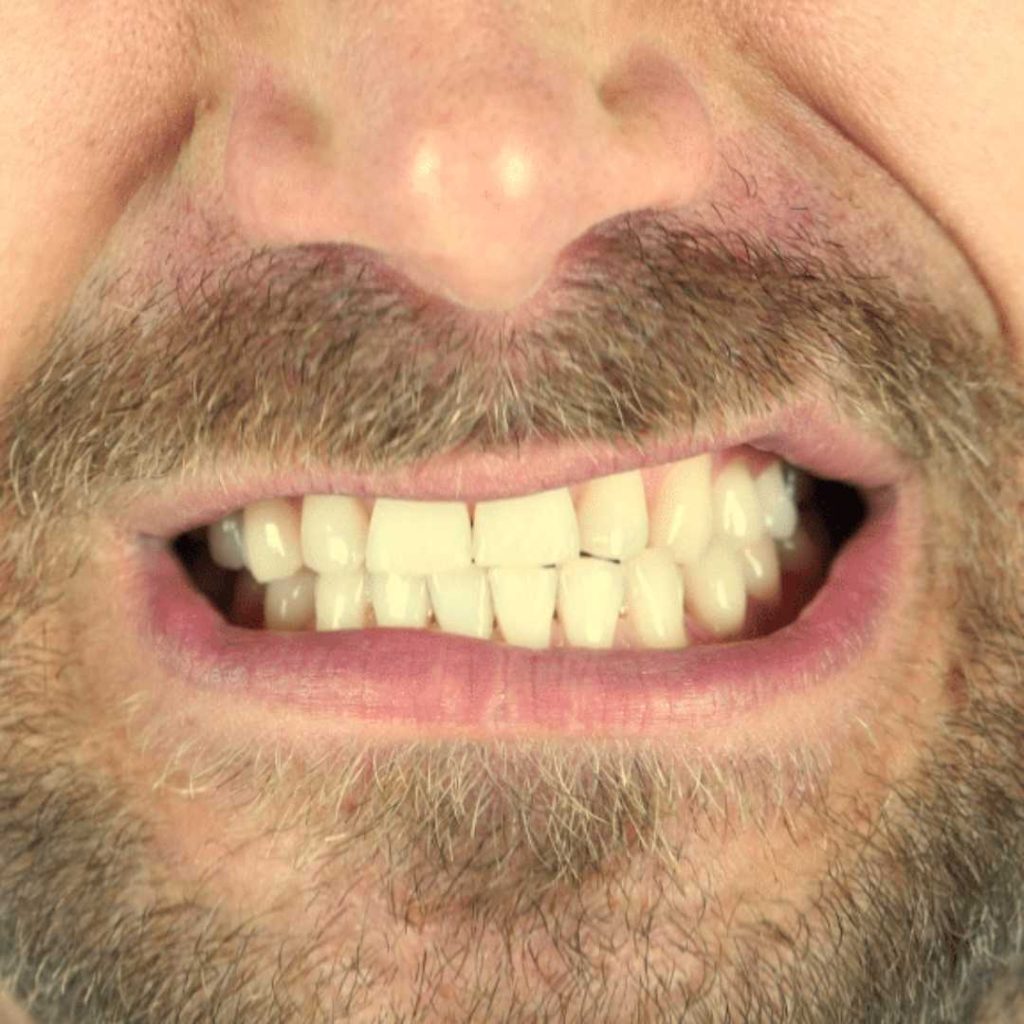TMJ Jaw Pain Calgary
TMJ Jaw Pain
TMJ jaw pain downtown calgary
Does bad posture cause jaw pain or TMJ?

Surprisingly, the connection between your posture and your jaw can be a cause of TMJ! TMJ is a multi-factorial disorder of the temporomandibular joints. Those joints allow jaw movement and daily jaw function like chewing, yawning, and talking. The most common TMJ symptoms can be jaw pain, headaches, neck pain, facial pain, ear ringing and a loss of normal daily jaw function. The biggest problem is that TMJ is related to a misaligned bite or some other dental issues that affect the positioning of your jaws.
Now you would think that anything to do with the jaw would be limited to the head. But guess what? You are not just a head. You are a head, connected to a neck, connected to a torso, and some assortment of limbs. Typically four.
Whatever happens with the bite and the TMJ will affect the rest of your body. This means you can have problems from TEETH to TOES! Not only can teeth affect muscles and alignment throughout your body, your body alignment and function can affect how your jaw works.
You probably think you have a great posture. And you may. But having good posture is not just about sitting and standing up straight. Many of us have a forward head posture, one shoulder lower than the other, one of our feet splaying out while the other is straight. These signs are all indications that the body is under some form of strain and must accommodate this strain in order to function during the day. All this body strain adds up and before you know it, you are having posture and TMJ problems
Why is poor posture a bad thing?
Poor posture can cause your muscles to have to work harder and lead to fatigue and even pain. When poor posture becomes a habit, you may feel discomfort if you try to straighten up. Many people see this as a reason to maintain their normal posture, but if you have a habitual posture problem, your muscles cannot get rid of the postural issues till the actual cause of the postural issues is dealt with. Guess what? That problem can be related to your bite and jaws.
How pain can throw off your posture
When you have chronic pain, you tend to position yourself in any way that gives you relief. This often means choosing comfort over good posture. You tend to collapse inwards. Your shoulders roll forward, the head and neck sit forward of the body, the back curves, the hips rotate, and the feet splay. You do this all because all these actions tend to help you breathe better.
Yup. It is often related to finding a body posture that facilitates a more relaxed breath. Your next breath is the most important thing in your life because if you cannot breathe … well that is why it is important. And that is why it is all related to your jaws, head, and neck. It is all a big circle of cause and effect.
So what do you do?
Get help for your jaws and your posture!
Have a dental exam to determine if you have a TMJ disorder that affects your posture. Please contact Calgary dentist Dr Westersund to schedule a consultation. We can help you learn more about TMJ disorder and how dental treatment could help.
calgary tmj jaw pain
Connect with Dentalife
Locking jaw or your jaw clicking and clenching?

As with anything you use daily, over time there is going to be significant wear and tear. The same principle applies to your teeth. Practically everything you do requires the use of your teeth and your jaws.
Jaw pain is common among Calgarians and the wear and tear can cause TMJ disorder, or TMJD for short.
Your bite (occlusion) plays an important role
- Your body has two stabilizing elements that help determine your posture. Two parts that are solid positions. One is the ground we stand on and the other is the stability your lower jaw provides when you bite your teeth together.
- These two positions help determine your body’s posture. If the ground is level your hips can be level. If your teeth mesh in a way your jaws, neck and shoulders line up, your upper body can be level.
- Your TMJ is the only joint in the body that has a “Terminal End Point”. A point that cannot be over-flexed or moved past. Teeth are hard. Once your teeth come together, your lower jaw stops moving and that determines where and how your jaw joint (TMJ) functions.
- The proper development of your upper and lower jaw and the way the teeth must mesh or occlude together is key to TMJ, Head / Neck / Shoulder / Back / Hip / Knee / Foot alignment. We are one person from Teeth to Toes.
- We all know that if we stand on a slope, our body must compensate for the unlevelled ground. What we may NOT know is that if your upper and lower jaw growth, the tooth position and the occlusion are misaligned, your body must compensate as well. Whether it is a sloped floor or a misaligned bite, muscles and bony structures automatically adjust. Your floor will not always be sloped but your bite cannot always level itself.
- The importance of a bad bite (malocclusion) is that your Jaw muscles, Head muscles and Neck muscles can never rest. They are under constant strain. Your TMJ and Cervical (neck) Vertebrae can often be misaligned for long periods of time.
- This chronic stress and strain to the body requires ‘Accommodation’ by the body’s many parts like muscles, tendons, ligaments, and nervous systems.
- This can create many varying effects we call signs and symptoms. Some people have little or no signs of symptoms. They can accommodate the strain their body is in. Others can have very severe pain problems and major losses of function in their body. Yet others only see changes in their teeth, gum tissue and the bone around the teeth. Some people have migraines, some have sensitive teeth, some have gum recession.
- TMJ Disorders can impact your teeth causing changes in the shape of your lips. Wrinkles and creases to form and deepen on the sides of your mouth and nose. The appearance of jowls on the sides of your jaw is often a loss of height in your teeth and jaws,
The type of Symptoms, the intensity, and the timing will vary with everyone. It is possible for there to be more ways a malocclusion affects the body than there are stars in the Milky Way.
My Jaw Locks
A common TMJ problem is a “Locked Jaw”. This often happens when the soft tissue around the TMJ jams up its ability to move freely. It is kinda like a bunched up rug preventing a door from opening wide.
The way you bite may be the original cause of the jaw locking. Strain in the bite will affect the TMJ and over time may cause chronic issues like a locked jaw. The most common jaw locking is closed. But sometimes the jaw locks open. This is often because the jaw joint ligaments are too lax or too stretchy. People with genetic connective tissue disorders often have an issue with a jaw that locks open.
Locked Jaws can also develop with muscle spasms that prevent the jaw from moving. Even head/neck misalignment can cause a locked jaw. It is important for all of these issues to be assessed.
Time is of the essence. If your jaw locks, get it assessed as soon as you can. Even if it locks for a while, and then it is fine, have it checked. This could be a warning of problems to come. Some hope that all clicking and locking will go away with time but that can just indicate that function is lost and you cannot open as wide or freely.

REVIEWS FOR DENTIST DOWNTOWN CALGARY
The Alberta Dental Association & College does not allow dentists to display any patient-reviews directly on their website.
Please find us by Googling: ‘Dentalife Patient Reviews’
tmj jaw pain treatment calgary
Am I just too stressed?

Structural stress, mental stress, physical stress elicit the same response in your body. You tighten up. Your muscles tense, your body stops moving as it should. Stress Sucks.
Many patients with stress complain of clenching and/or grinding their teeth. They may have been told they are too stressed and need to relax. Not an easy task. If you could relax you would not stress, right?
The problem is, while stress comes in many forms, it is not the only problem. While you may have “Stress” you probably also have “Strain”.
This physical strain within your body can happen due to unintentional misalignments of body structures. Misalignments happen due to growth issues, accidents, and activities. These misalignments require that your body accommodates its strain with your muscles, tendons, and ligaments. This accommodation within the body’s structures can be an important factor in clenching and grinding teeth and other TMJ disorders.
Did you know that you can clench and grind your teeth and be totally unaware of it until it causes you pain or it breaks a tooth? Clenching is used to stabilize the body by bringing the lower teeth into contact with the upper teeth. Teeth and jaws also come together each time we swallow (hundreds of times a day). If the alignment of teeth is imbalanced (a malocclusion), you have structural strain. This is why a dentist is able to provide a balanced bite analysis. It is an attempt to allow yourself to function without as much strain.
Let’s face it, telling yourself not to be stressed is not easy and may not be very effective. But willing away strain is not effective either. Understanding where the strain is present may allow you to have the proper Healthcare Provider help you. While TMJ function takes part of your head, all body systems can be affected. Treatment may be more effective if areas outside the care of a dentist are integrated.
When you have a misaligned jaw and a subsequent bad bite, the wear and tear on your teeth is significantly more rapid. The erosion of your teeth can lead to uneven tooth wear, loss of range of jaw motion, gum recession and various other symptoms – all connected to TMJ disorder or TMJD.
TMJD symptoms – clicking – pain – limitations… What’s going on?

- When you bite down, do you experience pain?
- Are you restricted with how much you can open your mouth?
- When you open your mouth wide – does your TMJ’s pop or click?
- Have friends or family members commented on how loud your clicking jaw or popping jaw is?
If you answered yes to even one of those questions, something isn’t right. A healthy and normal TMJ is quiet when it’s working it does not generate noise, limit mobility, or cause pain. During eating, chewing, singing, swallowing, talking, and even breathing – you should feel no discomfort or experience anything unusual.
The muscles that control your jaw should work in harmony, allowing you to open and close your mouth both smoothly and silently.
If you notice a constant clicking, popping, and snapping when you engage in everyday activities, something isn’t right. Clicking, popping and pain are indicators that your jaw joint may be unstable.
Jaw popping and your TMJ – pop goes your disc
- You have a disc of thickened ligament inside your jaw joint which keeps the lower jaw bone and the skull from rubbing together. With a malocclusion or unhealthy bite, this disc can be compromised and over time it no longer sits where it should.
- When the disc is out of place, the joints end sitting on soft tissue, when you open your mouth, the TMJ snaps back into place causing the clicking and popping sound you hear (disc displacement and your TMJ). Sometimes, it is loud enough to be heard by other people. Sometimes it hurts and limits the amount your mouth can open.
- When your jaw is misaligned and the jaw joint is not properly supported by your occlusion, it can be limited in its range of motion. You could be at a friend’s dinner party and suddenly you can’t open your mouth wide enough to eat. When you yawn or talk, you feel as though you need to help support your jaw. If you suffer from TMJD, the ability to open your mouth fully or widely can be limited and painful.
It is a like a muscle – tooth war inside your head
When your teeth bite in one spot but your muscles want your jaw to sit in another spot for balance and comfort, you develop tension within the jaw system. It is like a WAR, between the stable bite and the happiness of the soft structures like the jaw muscles and jaw joints.
In this WAR, one of 3 things can happen
- If your muscles are winning the war, they will tell the brain to grind your teeth to a spot that is less strained. The result can be rapid tooth wear.
- If your teeth win the war, they tell the muscles to work harder and keep clenching to provide support. You will have muscle tension and strain and may have more headaches and other TMJ problems. The good thing isyour teeth will not be worn down.
- In War, everyone loses: you will experience a combination of both tooth wear and jaw pain at the same time.

My chin is getting closer to my nose as my teeth wear away!
Jaw misalignment and tooth wear greatly influence the appearance of your face. A poorly aligned jaw can create deterioration and breakdown of your teeth, slowly altering the shape of your face. While there are other problems like GERD and Diet, wear on front or back teeth can happen.
This can be distressing. Some have experienced new restorations suddenly snapping off due to constant grinding of the teeth. Some have had tooth roots fracture, causing the tooth to be lost.
Are you taking a nail file to your teeth?
That sounds like a ridiculous question. But dentists often see teeth that have been worn in such a way that unless you are using a nail file on them you must be causing excess wear by constantly grinding the upper and lower teeth together.
Now we assume that you are not using a nail file but the fact remains that teeth are showing too much wear. This is your body’s response to a misaligned bite (malocclusion). The wear on teeth is slow, you are consciously unaware of it. Often grinding your teeth is so common, you may feel that it is normal. And it is.
Whatever you do with your jaw on a routine basis becomes normal to you. That does not mean it is healthy. That tooth grinding can eventually destroy your teeth.
“I don’t think I grind my teeth” is a common comment from patients. But what the patients do not realize is that the grinding does not require conscious thought to happen. In fact, the grinding takes place due to a neural loop from the teeth to the brain stem and back to the muscles of the head and neck. This grinding happens at the same level as blinking your eyes or swallowing saliva. You do not have to be aware of it for it to happen.
Many patients mistakenly think that tooth wear takes place at night and never during the day. But in reality, our teeth touch during the day as well. This wear pattern is a daytime function happening below our conscious level.
Are your teeth chipping or getting loose? Imagine backing your car out of the driveway every morning and constantly bump the yard fence with your bumper. You don’t hit it hard but you hit it every day. What will happen with that fence? Well, at some point the fence will break.
Now imagine that you are banging your teeth day and night, just a little, but all the time. What will happen? The teeth will break or become loose over time. This constant banging of the teeth can be a long-term problem. In turn, it can damage your teeth, gum tissue and jaw bone.
Mind and Body Connection
You are one person, one body, connected from teeth to toes. You are also a complicated set of systems, all working in conjunction, at the same time to allow you to function and survive. Dental care is just one part of an overall healthy body.
TMJ Jaw pain care
Are you experiencing some of these problems … or worse, all of them? We encourage you to talk to Dr. Westersund about TMJD treatment options. Learn how we can help relieve your jaw pain and how TMJ treatments can improve your well being. Preventing serious issues caused by TMJD early is important for your health including Lockjaw symptoms.
Schedule a consultation or call us at 403 262-9898 today
